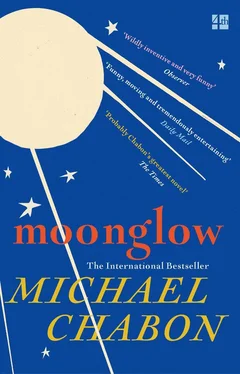“It drove me nuts,” he remembered. “I used to say, ‘ One deck! Is that too much to ask? Could there be one goddamn deck that isn’t ruined?’” He made a duck’s bill of his lips, narrowed his eyes, hoisted his shoulders. “‘ Boh. ’” I remembered this echt -gallicism of my grandmother’s. “She wasn’t ruining the deck, if you please, she was correcting it.” He put on the Texan-in-Paris accent he used whenever he spoke French. “ See-non, come-awn fair une pe-teet par-tee? ”
One afternoon when my grandmother sent me to get a deck so we could make a few parties , I discovered that since my last visit the drawer had been cleaned out and restocked with several new packs of poker decks, sealed and in their wrappers. It would be a worse outrage to my grandfather than usual, it seemed to me, to “ruin” one of these brand-new packs.
I opened some other drawers and poked around among the Yahtzee and Rack-O and Monopoly boxes, looking for any of the decks that my grandmother had previously stripped. Inside a tin that once held Barton’s almond kisses I found a deck of cards in a curiously drab box, pale blue printed with some words, which I took to be French, in a medieval-looking typeface like the one across the banner of The New York Times . It was thinner than an American deck, as if it contained fewer cards. Assuming that I had managed to locate an actual French piquet deck, I carried it into the kitchen, where my grandmother and I usually played.
I thought she would be pleased to see that I had found a way to keep my grandfather happy. Instead she looked alarmed. She was in the act of lighting one of the Wintermans cigarillos that she smoked only while playing cards, but she stopped with the match halfway to her mouth. My mother used to complain bitterly about the stink of my grandmother’s cigars in my hair and on my clothing when I was returned after a visit, but I thought they smelled wonderful.
She took the unlit cigarillo from her lips and returned it to its little tin. She held out her hand, palm up. I surrendered the pale blue box. She opened its flap, tipped out the cards, and set it down on the table by the ashtray. She held up the deck and fanned it so she could see the faces. I saw only the backs, midnight blue patterned with crescent moons.
She asked where I had found the cards. I told her, and she nodded. She remembered having hidden them there long ago. She explained that she’d had to hide them because they were magical cards, and my grandfather did not believe in magic. I must not tell him about the cards, she said; it would annoy him and he would throw them away. I agreed to keep the cards a secret and asked my grandmother if she believed in magic. She said she did not but that, surprisingly, magic worked even if you did not believe in it. She seemed to have entirely recovered from her alarm at the thought that my discovery might be discovered.
She held up the blue box and told me that the words printed there were German, not French, and that, translated, they read FORTUNE-TELLING CARDS FOR WITCHES.
I asked my grandmother if she was a witch. I had the odd sensation that it was a question I had been holding at the back of my tongue for a long time.
She looked at me and reached for the cigarillo she had put aside. She lit it, shook out the match. She shuffled the cards a few times with her long pale fingers. She set the deck on the table between us.
In putting down these very early memories of my grandmother, I have so far avoided quoting her directly. To claim or represent that I retain an exact or even approximate recollection of what anyone said so long ago would be to commit the memoirist’s great sin. But I have not forgotten my grandmother’s two-word reply when I asked if the reason she owned a secret deck of magical fortune-telling cards for witches was that she was herself a witch:
“Not anymore.”
I asked if this meant that she was no longer able or didn’t remember how to tell fortunes. It was probably a little of both, she said. She would, however, be happy to show me how her magical deck of cards could be used to tell a story . All I had to do—she demonstrated as she explained—was cut the cards, cut them again, and then choose three from the top of the deck.
I have never had success in tracking down or identifying my grandmother’s particular deck, the “Fortune-telling Cards for Witches,” or “The Witch’s Fortune-telling Cards,” or however the name was translated. It may be that things I heard afterward about my grandmother’s brief television career as a witch corrupted my recollection of the deck’s name—maybe they were called “Cards of a Gypsy Fortune-teller,” or “The Sibyl’s Fortune-telling Cards.” But I remember enough about the cards to conclude that it must have been a German variant on the standard “Lenormand” deck.
The first time I saw a classic Mexican Lotería deck with its iconic imagery ( El Sol, El Arbol, La Luna ), after moving to Southern California in the mid-’80s, I recognized its kinship to my grandmother’s. Her deck had a card called the Ship that showed an old-fashioned argosy under full sail beneath a sky filled with stars. The House was white stucco with a red tile roof and a pretty green garden. The Rider in his red tailcoat rode a prancing white horse through yellow and green woods. The Child in its neutering nightdress clutched a doll and looked afraid. As on the faces of most Lenormand decks, a small oblong panel, inset at the top of each card above the Scythe or the Birds or the Bouquet, depicted a pip or court card with the German suits of hearts, leaves, acorns, and bells.*
I don’t remember the first story she told me with her fortune-telling deck, or which set of three cards she drew it from. But after that first time, “playing with the story cards” became an occasional feature of our time together. There was no way to predict when the urge would come over her, though it came over her only when we were alone. In my memory of those occasions the day outside the windows of the apartment would be gray, cold, and wet; the weather may have played a part in putting her in the mood. Anyone who has spent time in the company of small children knows that a crushing boredom can unlock great powers of invention. My grandmother would be drifting gray and unfocused through an October afternoon, unsettled in the kitchen, wearying of my prattle. And then the cards would come out of their hiding place in the empty can of almond kisses, and she would say: “ Do you want me to tell you a story?”
At this point I always faced a dilemma. I liked the way my grandmother told a story, but the characters who emerged from her witch’s deck unsettled and frightened me, and the fates that befell them were dark. From the three cards I turned faceup on the kitchen table my grandmother’s imagination would wind a cryptic path to the narrative she unfolded. The Lilies, the Ring, and the Birds, say, would not necessarily produce a story that had anything to do with either lilies, rings, or birds, and if it did, then it would reveal something terrible about them, some latent capability for malice or liability to perdition.
In my grandmother’s stories wicked children received grim punishments, hard-earned success was forfeited in one instant of weakness, infants were abandoned, wolves prevailed. A clown who liked to scare children woke up one morning and found that his skin had turned paper-white and his mouth had twisted into a permanent grin. A widowed rabbi unraveled his tallis and used the thread and some of his dead wife’s clothes to sew their child a new mother, a soft golem silent as a raincoat. The stories gave me nightmares, but while she was telling them I found myself in the company of the grandmother I loved best: playful, exuberant, childlike, fey. In later years, whenever I recalled my grandmother to a close friend or a therapist, I would say that when she told a story, the actress in her came out. Her storytelling was a performance undertaken with ardor and panache. She did the different voices of animals, children, and men; if a male character disguised himself as a female, my grandmother would put on the funny, fluting voice that men affect in drag. Her foxes were suave, her dogs wheedling, her cows moronic.
Читать дальше












